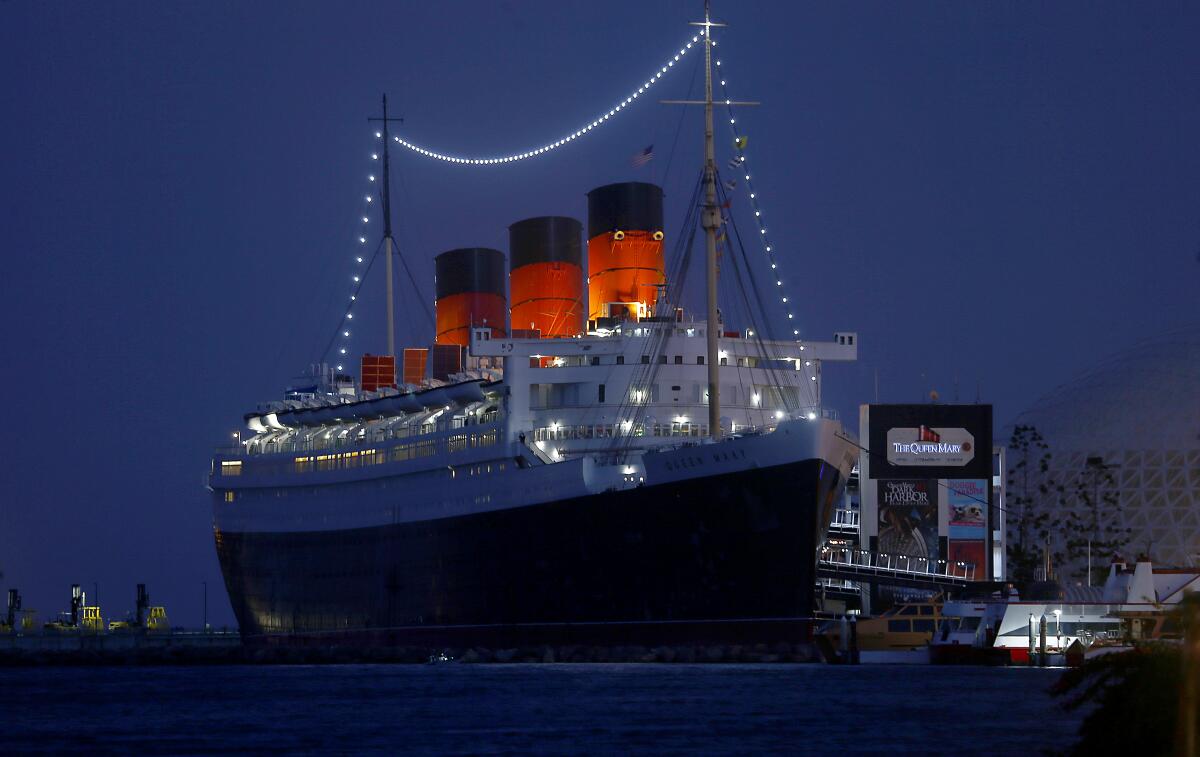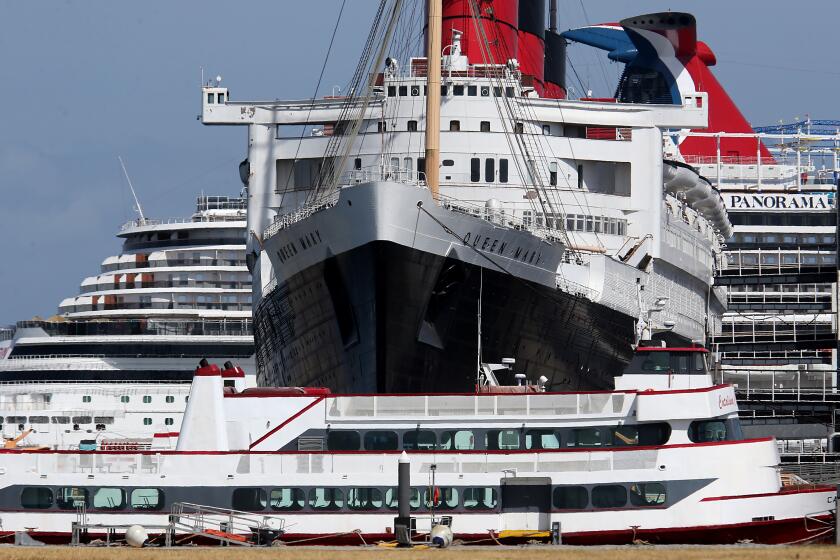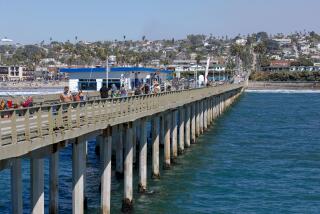Long Beach takes over Queen Mary, vowing to preserve the landmark ship

- Share via
Long Beach has taken back control of the Queen Mary from the ship’s operating company amid concerns that the 87-year-old vessel has not been properly maintained, the city announced Friday.
“For the first time in decades, Long Beach has full control of the Queen Mary. We will be fully engaged in the preservation of this historic landmark and are incredibly grateful for this opportunity,” Mayor Robert Garcia said in a statement.
The former ocean liner turned floating hotel has long been a challenge to operate, with a 2017 study recommending that as much as $289 million worth of renovations and upgrades were needed to keep parts of the ship from flooding. According to a trove of court documents and inspection reports released last month, the Queen Mary needs $23 million in immediate repairs to prevent it from potentially capsizing.
A trove of court documents and inspection reports released last month reveal the extent of the Queen Mary’s disrepair.
The company that held the lease to operate the ship, Eagle Hospitality Trust, filed for bankruptcy protection in January and agreed to surrender its lease agreement.
Long Beach, which owns the ship and the property around it, said Friday that Eagle Hospitality has been in default of several provisions of the lease, including failure to maintain the aging ship.
Long Beach also announced Friday that the city is immediately entering into a $2-million contract with Evolution Hospitality to act as a caretaker of the ship for the next six months. Evolution for the last 11 years has been the third-party contractor managing the day-to-day operations of the ship.
The Long Beach City Council is expected to meet Tuesday to approve the contract with Evolution and consider authorizing $500,000 to “begin testing and design work for the most critical repairs recommended in recent inspections, including bulkhead repairs, lifeboat removal, and the installation of an emergency generator, temporary bilge pumps and water intrusion warning systems,” the city’s statement said.
Eagle Hospitality’s bankruptcy proceedings are just the latest setback for the iconic vessel that Long Beach hoped would one day be the center of a thriving leisure district.
Over the last 50 years, Long Beach has brought in several firms — including Walt Disney Co. — to manage the ship and develop the adjacent oceanfront property, with mixed results.
Disney tried in 1990 to incorporate the ship into a $3-billion sea-themed amusement park. But the Burbank entertainment giant declined to renew its lease two years later and instead turned its attention to building the California Adventure park next to Disneyland.
One leaseholder filed for bankruptcy in 2005, and an operator abruptly ended its contract and walked away. For much of 2009, in the aftermath of the Great Recession, occupancy rates for the ship’s rooms dropped to 50% — barely enough to cover expenses.
Eagle Hospitality was created in 2019 by Urban Commons, the real estate investment and development firm that owned a 66-year lease to operate the Queen Mary and develop the 65 acres around it. The lease was set to last until 2082. The trust was listed on the Singapore Exchange with the goal of raising money to finance hospitality-related ventures primarily in the U.S., including a $250-million commercial development around the ship called Queen Mary Island.
Urban Commons released a plan in 2017 for the $250-million Queen Mary Island project, saying the entertainment complex on the waterfront adjacent to the ship was expected to help pay for the vessel’s desperately needed repairs.
Over the years, the ship has hosted music, food and holiday festivals, including Halloween celebrations and Friday the 13th-themed “haunted room” offerings that took advantage of the floating hotel’s historical interiors and myths.
Many of the ship’s rooms and event spaces have been renovated, but the most expensive structural improvements have been put off, according to inspection reports.
Eagle Hospitality, which owned 26 hotels, filed for bankruptcy as the COVID-19 pandemic devastated the travel and hospitality industries. January’s bankruptcy filing said the company had more than $500 million in liabilities, the largest of which was an $89-million loan from Lodging USA Lendo.
More to Read
Inside the business of entertainment
The Wide Shot brings you news, analysis and insights on everything from streaming wars to production — and what it all means for the future.
You may occasionally receive promotional content from the Los Angeles Times.












